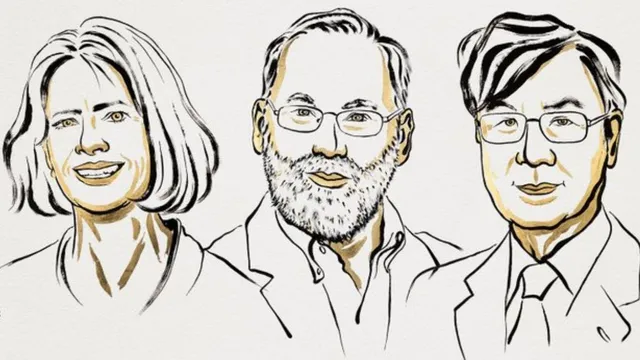- By Supratik Das
- Mon, 06 Oct 2025 03:36 PM (IST)
- Source:JND
The 2025 Nobel Prize in Physiology or Medicine was jointly awarded to researchers Mary E. Brunkow, Fred Ramsdell, and Shimon Sakaguchi for their "discoveries concerning peripheral immune tolerance", the Nobel Assembly at Sweden's Karolinska Institute said on Monday.
The three scientists' groundbreaking research has transformed immunology by uncovering how the body keeps its immune system from attacking its own cells, a process crucial for warding offautoimmune diseases while keeping defences against cancer and infection. "Their findings have set the stage for a new area of inquiry and have triggered the creation of new therapies, for instance, for cancer and autoimmune disease," the committee wrote in its formal report.
Each winner will receive a share of the 11 million Swedish crowns (around USD 1.2 million) award, as well as a Nobel medal and diploma awarded by Sweden's King Carl XVI Gustaf during a ceremony in Stockholm on December 10, the anniversary date of Alfred Nobel's death.
Breakthrough In Understanding Immune Balance
Shimon Sakaguchi, a renowned professor at Osaka University, first challenged the long-held notion that immune tolerance was established only in the thymus. In 1995, his research identified a new class of immune cells, regulatory T cells (Tregs), that act as guardians, preventing the immune system from turning against the body’s own tissues.
Building on Sakaguchi’s discovery, American scientists Mary Brunkow and Fred Ramsdell identified the critical Foxp3 gene in 2001 while studying autoimmune-prone mice. Their research revealed that mutations in this gene disrupt immune regulation, leading to severe autoimmune disorders.
Additional research established that the same mutations in humans result in IPEX syndrome, a lethal autoimmune condition found in infants but relatively rare. Sakaguchi then associated the Foxp3 gene with the development of regulatory T cells and their operation, binding together decades of work into one coherent process.
Transformative Impact On Medicine
The finding of peripheral immune tolerance has unveiled new pathways for treating multifactorial diseases. Ranging from autoimmune diseases like type 1 diabetes and multiple sclerosis to cancer immunotherapies and organ transplantation, the delineation of how regulatory T cells work has become the foundation of modern biomedical research.
Olle Kämpe, the chair of the Nobel Committee, stated the laureates' findings "have been decisive for our understanding of why we do not all develop serious autoimmune diseases." A number of experimental therapies based on Foxp3 and Treg biology are already in clinical trials, presenting new hope for millions of patients around the globe.
The Medicine Nobel Prize traditionally marks the beginning of Nobel week, followed by physics, chemistry, literature, peace, and economics announcements. The highly coveted prizes were introduced in 1901, according to Alfred Nobel's will, the Swedish philanthropist and inventor. The medicine prize was awarded last year to US scientists Victor Ambros and Gary Ruvkun for their discovery of microRNA and its function in gene expression regulation.
As the global community celebrates the 2025 Nobel winners, this year's awards bear out a key reality of science, that learning more about the body's balance between defence and tolerance can unlock the solution to some of mankind's most intractable diseases.
(With inputs from agencies)

